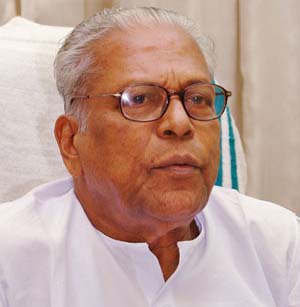Tamil Nadu should allow new dam at Mullaperiyar: Achuthanandan
 Thiruvananthapuram, Oct 28 : Kerala Chief Minister V. S. Achuthanandan Wednesday asked Tamil Nadu to agree to its demand for a new dam at Mullaperiyar as the present one had outlived its life.
Thiruvananthapuram, Oct 28 : Kerala Chief Minister V. S. Achuthanandan Wednesday asked Tamil Nadu to agree to its demand for a new dam at Mullaperiyar as the present one had outlived its life.
Achuthanandan said that a recent study conducted by Indian Institute of Technology (IIT)-Roorkee had found that the dam would collapse if an earthquake measuring 6.5 on the Richter scale occurred.
"Forty lakh people are living in constant fear in five districts in the state. In 1979, the Centre had cleared the proposal for a new dam and this was agreed upon by Tamil Nadu. But now they have changed their stand and they say even if lakhs die here, the present dam should be there," Achuthanandan told reporters here after the weekly cabinet meeting.
Kerala and Tamil Nadu have been at loggerheads over the present dam built under an agreement signed in 1886 between the then maharaja of Travancore and the British administration.
While the dam is located in Kerala's Idukki district, it serves Tamil Nadu. In recent years, Tamil Nadu has demanded that the storage capacity of the dam be raised from
136 feet (41.5 m) to 142 feet (43 m) to meet the increasing demand of water for irrigation.
Environment and Forests Minister Jairam Ramesh had recently given the nod for conducting a survey at Mullaperiyar for a new dam, for which the work commenced early this month.
The Supreme Court, meanwhile, Wednesday decided to appoint a joint committee of the two states to conduct a study on the safety of the dam while hearing a petition by Tamil Nadu to stop the survey.
In 1979, the Central Water Resources Commission had identified the place where the new dam is to be built.
Achuthanandan also said that the proposed protest day to be observed Nov 1 by Tamil Nadu against Kerala was just a gimmick as Chief Minister M. Karunanidhi and opposition leader J. Jayalalitha are vying with each other to impress the people of the neighbouring state. (IANS)